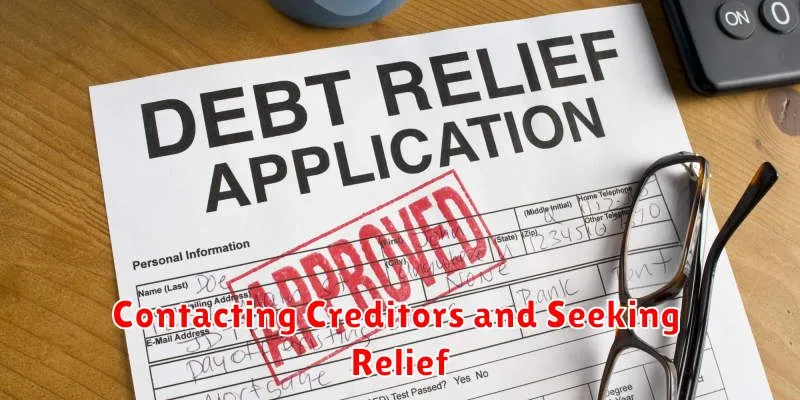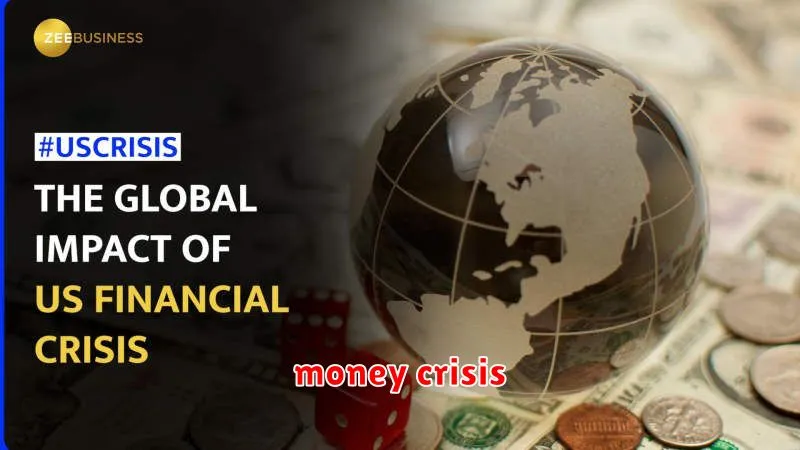Navigating financial challenges during a crisis can feel overwhelming, but with a proactive approach and the right strategies, you can effectively manage your finances and mitigate the impact of unexpected economic downturns. This guide provides actionable steps to help you weather financial storms, covering essential topics such as budgeting, emergency fund creation, debt management, and seeking financial assistance. Learn how to build financial resilience and protect your financial well-being during times of uncertainty.
Staying Calm and Focused During Financial Uncertainty

Financial crises can trigger intense emotional responses, but maintaining calm and focus is crucial for effective decision-making. Acknowledge your feelings, but avoid letting anxiety paralyze you. Practice mindfulness techniques like deep breathing or meditation to manage stress.
Prioritize your finances. Create a detailed budget, identifying essential and non-essential expenses. Focus on reducing unnecessary spending and explore avenues to increase income, if possible. Avoid impulsive decisions driven by panic.
Seek professional advice. Consult a financial advisor to assess your situation and develop a personalized strategy. They can help you navigate complex financial issues and provide objective guidance during uncertain times. Remember, you are not alone, and seeking support is a sign of strength, not weakness.
Maintain a positive outlook. While acknowledging the challenges, focus on your strengths and resources. Remember past successes and use them to build confidence in your ability to overcome this hurdle. Celebrate small victories along the way to maintain motivation and perseverance.
Assessing Your Current Financial Situation
Before addressing financial challenges during a crisis, a thorough assessment of your current financial situation is crucial. This involves gathering all necessary financial documents, including bank statements, credit card statements, loan documents, and investment records.
Next, list all your assets, such as cash, savings accounts, investments, and property. Simultaneously, itemize all your liabilities, including outstanding loans, credit card balances, and any other debts.
Calculate your net worth by subtracting your total liabilities from your total assets. This provides a snapshot of your current financial health. Understanding your net worth is essential in developing a strategic plan to navigate the crisis.
Further, analyze your monthly cash flow. Track your income from all sources against your essential and non-essential expenses. Identifying areas where you can reduce spending is a critical step in managing your finances effectively during challenging times. Prioritize essential expenses like housing, food, and utilities.
Finally, create a realistic budget that aligns with your current income and revised spending habits. This budget should serve as a roadmap to navigate your financial challenges and ensure your financial stability throughout the crisis.
Prioritizing Expenses and Cutting Costs Fast
Facing a financial crisis requires immediate action to stabilize your finances. Prioritizing expenses and implementing cost-cutting measures are crucial first steps. Begin by differentiating between needs and wants. Essentials like housing, food, and transportation should be prioritized. Non-essential spending, such as entertainment and dining out, should be drastically reduced or eliminated.
To cut costs quickly, consider these strategies: Negotiate lower bills with utility providers and telecom companies. Explore cheaper alternatives for groceries, such as shopping at discount stores or buying in bulk. Reduce transportation costs by carpooling, using public transport, or cycling. Identify and cancel any unnecessary subscriptions or memberships. Postpone large purchases and consider selling unused items to generate quick cash.
Careful budgeting is paramount. Track your spending meticulously to pinpoint areas where you can save. Creating a detailed budget will help you visualize your financial situation and make informed decisions about your spending. This process allows for efficient allocation of resources to cover essential expenses while minimizing unnecessary costs.
Remember, facing financial hardship often requires difficult but necessary choices. By aggressively prioritizing expenses and slashing unnecessary costs, you can create financial stability and navigate the crisis more effectively.
Using Emergency Funds Wisely
Emergency funds are crucial during a financial crisis. They provide a safety net, preventing you from accumulating debt or making drastic, potentially harmful, financial decisions.
Before accessing your emergency fund, carefully assess the situation. Prioritize needs over wants. Create a budget that outlines essential expenses and potential areas for temporary cost reduction.
Withdraw only what’s necessary. Track your spending meticulously. Consider using a dedicated account for emergency expenses to improve monitoring and control.
Once the crisis subsides, replenish your emergency fund as quickly as possible. Aim to rebuild it to its original level or even higher, for added security.
Remember, your emergency fund is a tool to navigate short-term financial difficulties. It should not be used for long-term expenses or investments.
Contacting Creditors and Seeking Relief

Facing financial hardship requires proactive communication with your creditors. Don’t ignore overdue payments; instead, contact each creditor immediately to explain your situation. Be honest and specific about your financial difficulties. Request a temporary reduction in payments, an extended repayment plan, or a temporary suspension of payments. Document all communication, including dates, times, and the names of individuals you spoke with.
Explore available debt relief options. These may include debt management plans (DMPs) offered by credit counseling agencies, which negotiate lower interest rates and consolidated payments with creditors. Debt consolidation loans can simplify your debt by combining multiple debts into one manageable payment. Consider bankruptcy as a last resort, after exploring all other options. Consult with a financial advisor or credit counselor to determine the best course of action based on your individual circumstances.
Remember to carefully review any agreements made with creditors before signing. Understand the terms and conditions, including any potential fees or penalties. Prioritize communication and transparency to improve your chances of securing relief and preventing further damage to your credit score.
Finding Temporary Income Sources
Facing financial hardship requires exploring temporary income sources to bridge the gap. Consider options like freelancing on platforms offering short-term projects, leveraging existing skills through gig work, or participating in the gig economy.
Selling unused possessions, such as clothes, electronics, or furniture, through online marketplaces or consignment shops can provide immediate funds. Exploring part-time employment opportunities, even for a limited period, can offer a steady stream of income.
If eligible, applying for government assistance programs or exploring community resources like food banks and financial counseling services can provide crucial support during challenging times. Remember to thoroughly research any opportunity before committing to ensure its legitimacy and suitability.
Finally, budgeting meticulously and prioritizing essential expenses is critical during a financial crisis. Tracking income and expenditures carefully helps manage resources efficiently and maximize the impact of temporary income streams.
Avoiding Scams and Desperation Traps
Financial crises can leave individuals vulnerable to scams and desperation traps promising quick fixes. Be wary of unsolicited offers promising unrealistic returns or immediate debt relief. Legitimate financial institutions will not pressure you into making hasty decisions.
Verify the identity and legitimacy of any organization or individual offering financial assistance. Check online reviews and contact your state’s attorney general’s office or consumer protection agency to report suspicious activities. Never share sensitive personal or financial information unless you are absolutely certain of the recipient’s legitimacy.
During stressful times, it’s crucial to avoid impulsive decisions. Take time to assess any offer carefully. Seek advice from trusted financial advisors or non-profit credit counseling agencies before making any major financial commitments. Remember, reputable organizations will prioritize your financial well-being and provide transparent, realistic solutions.
Avoid high-pressure tactics. Legitimate businesses operate with professionalism and respect. If you feel pressured or uncomfortable, walk away. Protecting your financial security requires vigilance and a cautious approach, especially when facing difficult circumstances.
Planning Your Recovery and Future Resilience
Navigating financial challenges requires a robust recovery plan. Assess your current financial situation thoroughly, including debts, assets, and income sources. This provides a foundation for strategic decision-making.
Develop a realistic budget that prioritizes essential expenses. Explore options for reducing non-essential spending and increasing income streams, such as seeking additional work or selling assets.
Seek professional guidance if needed. Financial advisors can provide personalized strategies for debt management, budgeting, and investment planning. Consider exploring government assistance programs or credit counseling services.
Build an emergency fund to mitigate future financial shocks. Aim to save at least three to six months’ worth of essential living expenses. This buffer protects against unexpected events.
Focus on long-term financial resilience. Improve your credit score, diversify your income, and educate yourself on financial literacy. Continuous learning fosters informed decision-making and reduces vulnerability to future crises.

